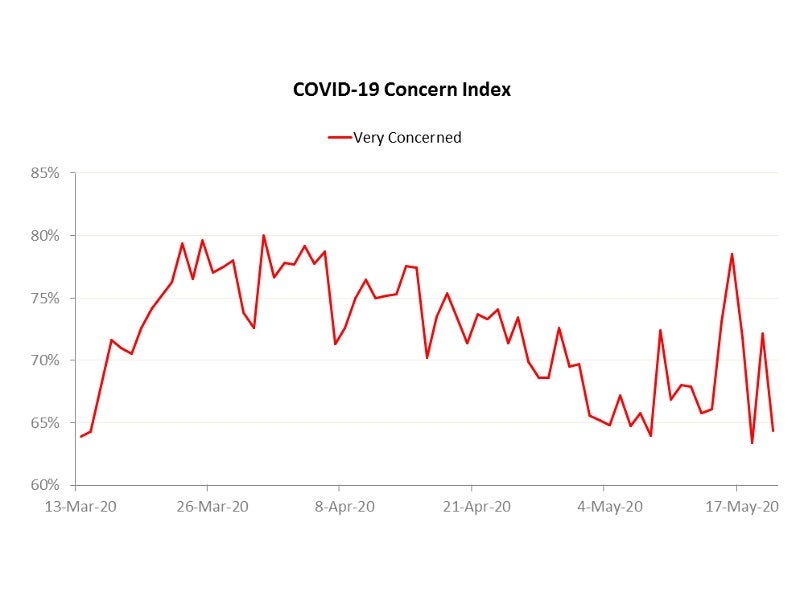
The COVID-19 concern index, as measured by responses to an ongoing poll launched by Verdict in March, has been tracking how the concerns over coronavirus have been changing over time.
The poll asked how concerned the respondent is about the spread of coronavirus and includes five options to choose from – very concerned, slightly concerned, neither concerned nor unconcerned, not very concerned, and not concerned.
Concern index is based on respondents, who answered that they are very concerned about the spread of COVID-19.
Concerns during the first half of April remained high but declined steadily from mid-April through the first week of May reflecting confidence over the pandemic’s containment following the lock-down announcements globally.
However, as the infection rates started to drop and governments saw the need to reopen their economies, a significant number of countries started announcing either a partial or full reopening of non-essential businesses and national/international transport.
Following these announcements, the trend reversed from the second week of May, with a significant increase in the number of respondents that expressed a high concern.
How well do you really know your competitors?
Access the most comprehensive Company Profiles on the market, powered by GlobalData. Save hours of research. Gain competitive edge.

Thank you!
Your download email will arrive shortly
Not ready to buy yet? Download a free sample
We are confident about the unique quality of our Company Profiles. However, we want you to make the most beneficial decision for your business, so we offer a free sample that you can download by submitting the below form
By GlobalData

The percentage of highly concerned respondents, which was at a peak of 80.08% at the end of March, declined steadily to 64% by the first week of May but reversed thereafter to reach 78.58% on 16 May.
The analysis is based on a total of 138,055 responses received between 13 March and 20 May.
Countries that have eased COVID-19 lockdown restrictions in May
Germany was one of the first countries in Europe to ease lockdown restrictions as it allowed shops to reopen on 06 May.
Baltic countries allowed cross border travel, while Serbia lifted its state of emergency on 06 May. Spain, Italy and France are few other European countries that have gradually eased restrictions.
Among Asian countries, New Zealand was the first to move out of the national state of emergency on 13 May. Although lockdown is in place until 31 May, India eased certain restrictions such as allowing domestic travel and opening of select non-essential businesses.
Some of the US states have started allowing certain businesses to open although a nationwide lockdown is still in place.
Russia started lifting restrictions on 11 May allowing public gathering to resume and approving the entry of foreign athletes. Turkey started to ease restrictions allowing shopping malls, barber shops, and beauty salons to open although a four-day lockdown was implemented over the Eid weekend.
Malaysia has extended its movement restriction ban until 06 June although some businesses have been allowed to open.
At least 33 more countries have eased restrictions, including Switzerland, Senegal, Iran, Slovenia, Jordan, Croatia, Kyrgyzstan, Lebanon, Greece, Philippines, North Macedonia, Mexico, Japan, Brunei, Myanmar, Tunisia, Poland, Egypt, Israel, Malta, Nigeria, UAE, Syria, Czech Republic, Singapore, Thailand, Qatar, Cyprus, Venezuela, Cambodia, Denmark, Palestine, and Iceland.
COVID-19 concerns could remain high due to future easing
The COVID-19 concerns could continue to remain high amid increased public movement and fears of a second wave of infections. Further, more countries are expected to ease lockdown measures in the coming weeks.
Countries that are likely to either ease lockdown measures or reopen their economies over the next few weeks include Scotland (28 May), Kuwait and Algeria (31 May), Nepal (02 June), Argentina (07 June), Morocco (10 June), Armenia (13 June), and UK (15 June).







